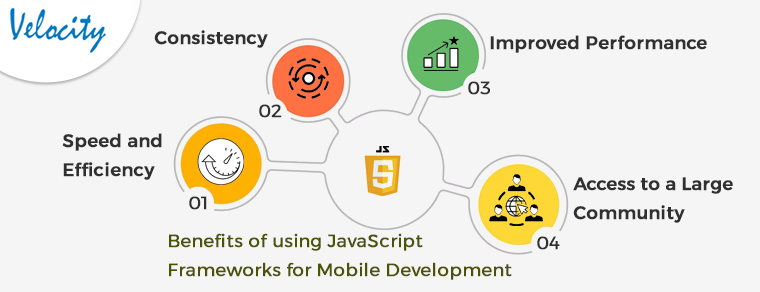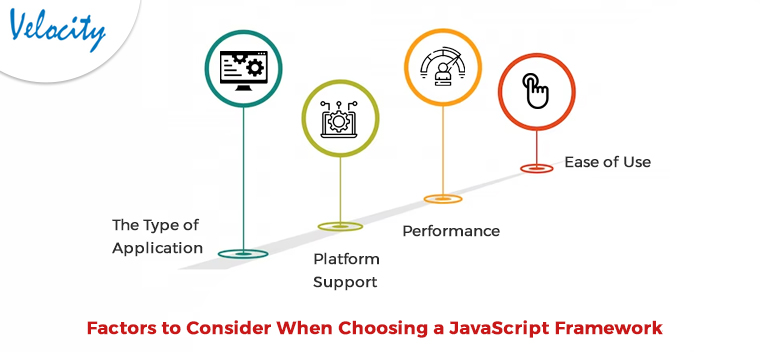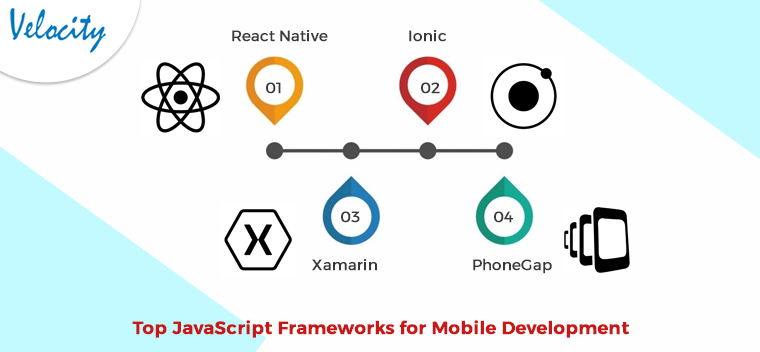Mobile devices have become an integral part of our daily lives, and the demand for mobile applications continues to grow. As a result, the development of mobile applications has become a crucial aspect of modern software development. One of the most popular programming languages for developing mobile applications in JavaScript. Its versatility and ease of use have become the go-to choice for many developers.
This article will look at the top JavaScript frameworks for mobile development, as selected by experts in the field. These frameworks have been chosen based on their popularity, features, ease of use, and overall impact on the mobile development community.
Background on JavaScript Frameworks
Before we dive into the expert picks, let’s first understand what JavaScript frameworks are and why they are essential for mobile development.
Definition of JavaScript Frameworks
A JavaScript framework is a pre-written code library that developers can use to save time and effort when developing applications. It provides a structure for building applications and includes tools and libraries for everyday tasks. This allows developers to focus on the unique aspects of their application rather than having to write the same code repeatedly.
Benefits of using JavaScript Frameworks for Mobile Development
There are several benefits to using JavaScript frameworks for mobile development, including:
Speed and Efficiency:
JavaScript frameworks provide developers with pre-written code, which saves time and effort. This allows developers to focus on creating the unique aspects of their applications.
Consistency:
JavaScript frameworks provide a consistent structure for building applications. This consistency makes it easier for developers to work together and ensures that the code is organized and readable.
Improved Performance:
JavaScript frameworks often include optimization techniques and performance enhancements, which can help improve the overall performance of an application.
Access to a Large Community:
JavaScript is a popular programming language, and many of the top JavaScript frameworks have large communities of developers. This community can provide support, resources, and even add-ons and plugins.
Factors to Consider When Choosing a JavaScript Framework
When choosing a JavaScript framework for mobile development, it is essential to consider several factors, including:
The Type of Application:
Different frameworks are better suited for different types of applications. For example, some frameworks are better suited for gaming applications, while others are better suited for business applications.
Platform Support:
Some frameworks support multiple platforms, while others only support specific platforms. Choosing a framework that supports the media you want to target is important
Performance:
A framework’s performance can significantly impact the overall performance of an application. It is vital to choose a framework that provides fast and efficient performance.
Ease of Use:
The ease of use of a framework can impact the development time and overall cost of a project. Choosing a framework that is easy to learn and use is essential.
Top JavaScript Frameworks for Mobile Development
Framework #1: React Native
React Native is a popular open-source framework for developing mobile applications using JavaScript. It was developed by Facebook and is widely used for creating cross-platform applications for both iOS and Android.
Features
Cross-Platform Support:
React Native supports iOS and Android platforms, making it an excellent choice for cross-platform development.
Easy to Learn:
React Native is built using React, a popular JavaScript library for building user interfaces. This makes it easy for developers already familiar with React to get started with React Native with a similar outline for the remaining frameworks.
Native Performance:
React Native uses native components, which provide a high level of performance and a native feel to the user experience.
Large Community:
React Native has a large and active community of developers, which provides support, resources, and even add-ons and plugins.
Pros and Cons
Pros:
Cross-Platform Support:
React Native supports iOS and Android platforms, making it an excellent choice for cross-platform development.
Easy to Learn:
React Native is built using React, a popular JavaScript library for building user interfaces. This makes it easy for developers who are already familiar with React to get started with React Native.
Native Performance:
React Native uses native components, which provide a high level of performance and a native feel to the user experience.
Cons:
Steep Learning Curve:
While React Native is easy to learn for those who are already familiar with React, it can have a steep learning curve for those who are not.
Lack of Custom Components:
React Native has a limited number of custom components, which can limit the customization options available to developers.
Framework #2: Ionic
Ionic is a popular open-source framework for developing mobile applications using JavaScript. It is a cross-platform framework that supports both iOS and Android platforms.
Features
Cross-Platform Support:
Ionic supports iOS and Android platforms, making it an excellent choice for cross-platform development.
Easy to Learn:
Ionic uses Angular, a popular JavaScript framework, which makes it easy for developers who are already familiar with Angular to get started with Ionic.
Large Community:
Ionic has a large and active community of developers, which provides support, resources, and even add-ons and plugins.
Pros and Cons
Pros:
Cross-Platform Support:
Ionic supports both iOS and Android platforms, which makes it an excellent choice for cross-platform development.
Easy to Learn:
Ionic uses Angular, a popular JavaScript framework, which makes it easy for developers who are already familiar with Angular to get started with Ionic.
Large Community:
Ionic has a large and active community of developers, which provides support, resources, and even add-ons and plugins.
Cons:
Performance Issues:
Ionic can have performance issues, especially when developing complex applications.
Framework #3: Xamarin
Xamarin is a popular open-source framework for developing mobile applications using C#. It is a cross-platform framework that supports both iOS and Android platforms.
Features
Cross-Platform Support:
Xamarin supports iOS and Android platforms, making it an excellent choice for cross-platform development.
Native Performance:
Xamarin uses native components, which provide a high level of performance and a native feel to the user experience.
Large Community:
Xamarin has a large and active community of developers, which provides support, resources, and even add-ons and plugins.
Pros and Cons
Pros:
Cross-Platform Support:
Xamarin supports both iOS and Android platforms, which makes it an excellent choice for cross-platform development.
Native Performance:
Xamarin uses native components, which provide a high level of performance and a native feel to the user experience.
Large Community:
Xamarin has a large and active community of developers, which provides support, resources, and even add-ons and plugins.
Cons:
Steep Learning Curve:
Xamarin uses C#, which may have a steep learning curve for developers unfamiliar with the language.
Performance Issues:
Xamarin can have performance issues, especially when developing complex applications.
Framework #4: PhoneGap
PhoneGap is a popular open-source framework for developing mobile applications using HTML, CSS, and JavaScript. It is a cross-platform framework that supports both iOS and Android platforms.
Features
Cross-Platform Support:
PhoneGap supports iOS and Android platforms, making it an excellent choice for cross-platform development.
Easy to Learn:
PhoneGap uses HTML, CSS, and JavaScript, which makes it easy for developers who are already familiar with these technologies to get started with PhoneGap.
Large Community:
PhoneGap has a large and active community of developers, which provides support, resources, and even add-ons and plugins.
Pros and Cons
Pros:
Cross-Platform Support:
PhoneGap supports both iOS and Android platforms, which makes it an excellent choice for cross-platform development.
Easy to Learn:
PhoneGap uses HTML, CSS, and JavaScript, which makes it easy for developers who are already familiar with these technologies to get started with PhoneGap.
Large Community:
PhoneGap has a large and active community of developers, which provides support, resources, and even add-ons and plugins.
Cons:
Performance Issues:
PhoneGap can have performance issues, especially when developing complex applications.
Limited Access to Native Features:
PhoneGap relies on web technologies, which may limit access to native features and result in a less native user experience.
Security Concerns:
PhoneGap applications can be more vulnerable to security threats, especially if proper security measures are not taken.
Conclusion
Choosing the proper JavaScript framework for mobile development can be challenging, but with the expert picks outlined in this article, you should be able to make an informed decision. Whether you are developing an enterprise application, a business application, or a gaming application, there is a JavaScript framework that is right for you.
Each framework has its strengths and weaknesses, and the right choice will depend on your specific needs and requirements. However, with this comprehensive guide, you should be able to find the best JavaScript framework for your mobile development project.
If you have any questions or need additional information, feel free to reach out to the large and active community of developers in each framework. With the proper support and resources, you can develop a high-quality, high-performance mobile application in no time.











